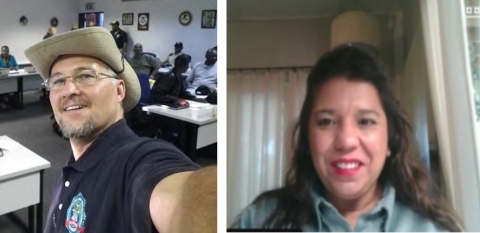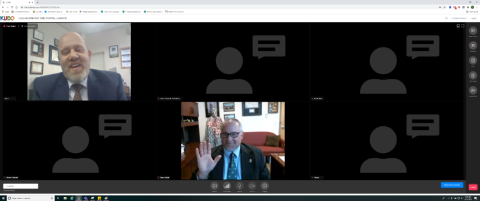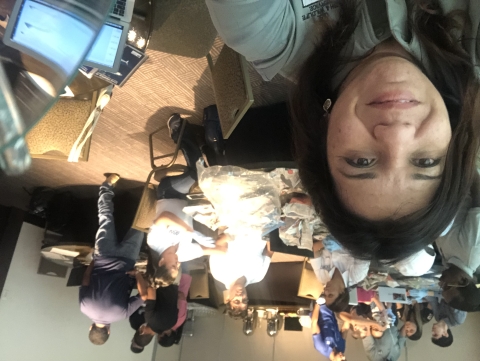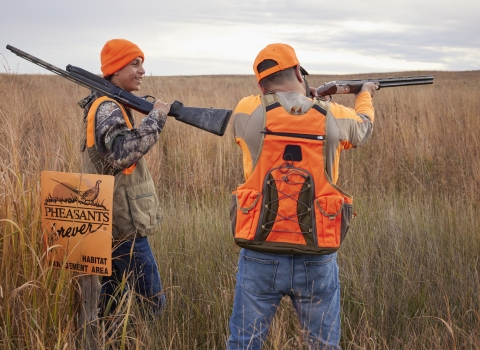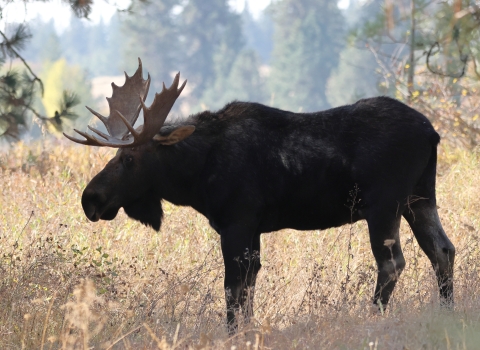A Joint Effort to Build a Wildlife Law Enforcement Network: a Need, a Course, and a Partnership
The U.S. Fish and Wildlife Service (Service), Office of Law Enforcement’s (OLE) formal relationship with the ILEA Gaborone began in the fall of 2002 when the U.S. Department of State, Bureau of International Narcotics and Law Enforcement Affairs (INL) requested the Service provide experts to train international counterparts on wildlife trafficking.The OLE’s Branch of Training and Inspection (BTI) is the unit responsible for this type of training and arranged for and deployed the first team of Service subject matter experts (SMEs) as trainers.
Before the Service’s involvement, the ILEAs had been bringing U.S. law enforcement officers to instruct a variety of general law enforcement courses; however, no course was taught specifically to the needs of wildlife officers, investigators, and inspectors. Due to the success of this initial wildlife crime course, what started as a one-time class is currently taught twice a year and offered at all six ILEAs. It was also the course that solidified the ILEA-Service relationship and was the foundation for additional courses such as the Wildlife Trafficking and Model Law-Executive Policy and Development Symposium on Transnational Crime, Wildlife Border Training Inspection Program, Wildlife Trafficking Investigators Program, and Wildlife Trafficking Cybercrime Program.
The Partnership and Commitment Continues
Fighting wildlife crime and criminal networks require us to work together globally and remain nimble - we must adapt as the trade changes and be well trained to take on evolving trade trends.
Based on the needs of the field and the ever-changing landscape of wildlife trafficking, the Service, the INL, and the ILEAs continue to develop new training programs for active law enforcement officers and officials and continued opportunities for alumni.
The courses provide field rangers, inspectors, investigators, prosecutors, and others with up-to-date skills to protect wildlife; deter crime; and detect, investigate, and prosecute those who violate wildlife laws.
These courses also support executives and senior level officials who supervise or manage wildlife programs and create policy.For example, the Wildlife Trafficking and Model Law-Executive Policy and Development Symposium on Transnational Crime has been very successful.In fact, retired ILEA Roswell Director John Chavers said, "The U.S. Fish and Wildlife Service's BTI executive level curriculum and instruction exceeded everyone’s expectations, as it set the stage for not only executive law enforcement cooperation regionally in Africa, Asia, and Latin America, but also led in the creation of cross-continent training efforts and stronger relationships globally, which in turn equates to greater operational success in countering transnational organized crime."
This particular course was designed to build a comprehensive national response model to combat wildlife trafficking.The curriculum focuses on leadership, ethics, and organizational change principles, through which delegates will gain essential skills in communication, critical thinking, and decision making.In addition, Service SMEs identify key areas of policy, enforcement guidance, and criminal justice and explain the system of identifying, investigating, and prosecuting crimes - the cornerstones to successful outcomes of wildlife crime.
To ensure a complete success, all delegates have the opportunity to personally meet their Service attaché who is assigned to assist their wildlife enforcement network.These Service senior special agents are wildlife law enforcement experts and stationed at U.S. embassies in physical locales that experience a high level of wildlife trafficking.The attachés and ILEA graduates build professional networks across the world to unify the fight against wildlife crime.
Meet the BTI ILEA Program Management Team
It takes remarkable leadership to create a successful training program. Steering these efforts for the Service is a leadership team that is committed to keeping the courses both relevant and timely.
The BTI is led by Special Agent in Charge Bruce Kindle and BTI’s ILEA Program Manager is Cindy Mercado.Together with the other BTI staff, they maintain a close working relationship with the ILEAs management teams to ensure the course curriculums meet the needs of class participants and ensure the instructor teams are comprised of Service SMEs who have extensive expertise and knowledge of the subjects being taught.
ILEA Programs Focus on Combating Wildlife Crimes
Currently, the BTI offers four programs in cooperation with the ILEAs. The courses are tailored to the variety of positions that have a role in combating wildlife trafficking. Each course is taught by subject matter experts and designed to have approximately 40 delegates or participants. The courses highlight the techniques unique to different facets of conducting border inspections, conducting cyber and wildlife crime investigations, and developing laws and policies to improve prosecutions and deter wildlife trafficking crimes. Critical to each of these courses, and success in the field, is an emphasis on building networks to fight transnational wildlife criminals.
BTI’s Current ILEA Curriculum
(In cooperation with the INL and the ILEAs), the BTI offers:
Wildlife Trafficking and Model Law-Executive Policy and Development Symposium on Transnational Crime
This two-week symposium focuses on building a comprehensive national response model for combating wildlife trafficking. This executive course hosts 40 delegates who are responsible for leading change, policy, and critical thinking in order to deter transnational organized crime syndicates and to build a law enforcement network that is needed to beat a criminal network.
Delegates gain essential skills in communication, critical thinking, and decision-making, which are vital when acting in a leadership role.The curriculum includes topics such as criminal justice, investigations, and prosecuting wildlife criminals, all of which are explained in detail.
Service SMEs identify the latest policy guidelines, enforcement guidance, and legislative developments and outline statutes that have been developed to combat wildlife crimes. The symposium also provides the delegates with instruction on how wildlife traffickers and criminal trafficking organizations commit their crimes and the techniques, tools, and strategies needed to successfully investigate and prosecute wildlife traffickers.
The symposium explores the process of an investigation and prosecution to facilitate the understanding of the structures and strategies needed to effectively combat these crimes. The goal of this symposium is to teach the delegates how to effectively, and strategically, develop a comprehensive response to the difficulties of wildlife trafficking. An open forum with WTES alumni provides the opportunity to explore the successes with local contacts, Service SMEs, and their closest Service attaché.
Wildlife Border Inspection Training Program
The one-week curriculum is taught by Service and the U.S. Customs and Border Protection law enforcement officers and provided to approximately 40 participants.It combines both classroom and practical field exercises blended in a way to provide an overview of inspection techniques, identification of trends, and how to identify illegal wildlife at the border.Training includes the implementation of the Convention on International Trade in Endangered Species of Wild Fauna and Flora (CITES), wildlife trade data, wildlife identification, case initiation and management, interview techniques, border interdiction, evidence processing, ethics, corruption, and the importance of court preparation.
Throughout the course, the delegates are shown the latest interdiction techniques used at U.S. (and the host nation’s) ports of entry and a variety of smuggling methods.The instructors also encourage an active exchange of information and techniques between all participants in order to learn from each other and create effective procedures to fight wildlife trafficking. This open dialogue throughout the course provides the opportunity for host nations to gain insights on specific wildlife trafficking trends, faced by the participating countries, and are used to further secure their own borders.
In addition, the participants meet their closest Service attaché to begin a professional working relationship.The attachés and the ILEA graduates create an alliance of host nations that share knowledge, skills, and intelligence.
Wildlife Trafficking Investigators Program
This two-week course provides an overview of various wildlife trafficking investigative topics, is presented twice a year, and seats up to 40 participants per session. The curriculum focuses on endangered species law; CITES wildlife trade data; wildlife identification; case initiation and management; digital evidence; forensics and crime scene processing; surveillance; undercover operations; money laundering; interviewing; ethics and corruptions; warrant execution; report writing; and court preparation.
The course emphasizes the importance of developing and maintaining global contacts to exchange intelligence between countries because this open dialogue provides the opportunity for host nations to gain insights on specific wildlife trafficking problems that are present in the participating countries. Instructors introduce and discuss techniques and methods available to combat specific wildlife investigative issues and provide an opportunity for the participants to meet their Service attaché, exchange contact information, and begin a professional relationship built upon trust. This exchange of intelligence and cooperation on investigations is crucial in combating international wildlife trafficking.
Wildlife Trafficking Cybercrime Program
This one-week curriculum was created for investigators and computer experts and provides advanced cybercrime investigative topics related to wildlife trafficking.Forty participants are taught the latest techniques to document digital evidence; crime scene processing; online undercover operation considerations; and e-mail, social media, and online marketplace investigations.
The course provides investigatory strategies to identify, prove, or disprove wildlife crimes using cybercrime detection tools and techniques.Instructors encourage an open dialogue throughout the course so participants may gain insights on their own specific wildlife cybercrime issues and offer techniques and methods to combat those investigative challenges, ultimately so that participants may use these skills to solve cyber wildlife crimes.
Connections and Success in the Classroom Lead to Success in the Field
These courses have been taught at the ILEAs for almost 20 years and there have been several successful outcomes.In particular, is the creation of multiple international conservation law enforcement partnerships.Through these partnerships, wildlife conservation officers have become global partners who share intelligence, skills, and knowledge; therefore, improving the unified fight against wildlife crimes and wildlife trafficking.
The Service’s Continued Commitment, Based on Need and a Shared Purpose
Through the BTI, the Service looks forward to our continued relationship with the ILEAs and its alumni. Protecting our wildlife resources and combating wildlife trafficking remain a critical need. As these criminal networks become more sophisticated, so must we in the conservation law enforcement community. BTI’s SAC Bruce Kindle said, “ILEA Gaborone has been a valued partner for nearly 20 years, and we look forward to continuing to find ways to work together to support law enforcement officials around the world to solidify a global enforcement network that truly leads to borderless protection for wildlife worldwide.”
The Importance of Staying Connected
Since 2014, the OLE has been building a corps of attaches to serve as conduits to share information and build expertise in various regions of the world. There are currently four attachés in Africa serving the southern, western, eastern, central, and the Horn of Africa regions. These attachés are a local point of contact to share intelligence, gain assistance, and to provide localized training. The BTI uses training programs to introduce these attachés to course participants so they know whom to contact and build a professional relationship.These relationships provide an opportunity to work together for the protection of our treasured lands, wildlife, plants, and people, and together we leverage a stronger and just hand in our role to protect and facilitate legal wildlife movement across our borders.We understand the value of joining the attachés and in-country experts in their investigative and wildlife coordination needs both in Africa and around the world.
The Service is committed to providing the resources to share knowledge and expertise, build capacity, and to provide ways to stay connected. If there is a need in the field for training in a particular subject matter, we may be able to provide training to address those needs, so please contact Program Manager Cindy Mercado at cindy_mercado@fws.govto discuss those needs. We want to hear your ideas and work together to combat the illegal wildlife trade, its commercialization, and the illegal profits of trafficking protected wildlife and plants species. Contact Cindy
